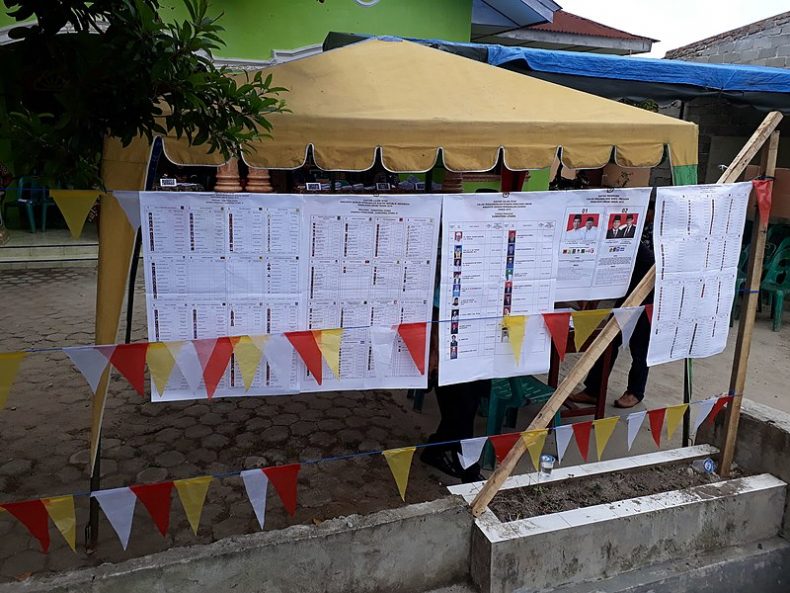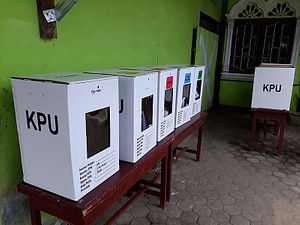On April 17, Indonesia, the world’s third-largest democracy, held the biggest and most-complex single-day elections in world history: 193 million registered voters, 20,500 candidates, and 800,000 polling booths. It was the first time Indonesia held presidential, legislative, and provincial and local elections at the same time.
Turnout, especially among millennials, exceeded expectations, with 80 percent of eligible voters casting ballots. But an overwhelming turnout alone does not necessarily make for a successful, democratic election. While the largely free and fair vote has been lauded as a logistical success, there are teetering issues that Indonesian authorities must address before the next election. In particular, too many Indonesian voters did not have access to reliable information about the candidates running in legislative races.
Voters had to mark five separate ballots: one for the presidential race, a second and third for Indonesia’s national parliamentary chambers (the DPR and DPD), and a fourth and fifth for provincial and municipal legislative councils. With 19 political parties contesting the elections and squeezing in as many as seven candidates per race, Indonesian ballots became as cumbersome as old-time folding road maps. This created two challenges. Gathering basic information about the background and political platforms of close to 200 candidates per seat proved a difficult — and time-draining — feat for even the most politically savvy voters. Voters also struggled to figure out how to fold the ballot tightly enough to fit into the slot of the ballot box.

The staggeringly long list of candidates voters were choosing between hangs outside a polling station in North Sumatra. Photo from Wikimedia Commons/ Davidelit.
Simultaneous elections had another troubling side-effect. The presidential race between the incumbent Joko Widodo and Prabowo Subianto largely eclipsed the legislative races. And the legions of candidates running in legislative races overwhelmed efforts by civil society organizations to monitor the transparency of the elections.
This is problematic, considering that Indonesia ranks a dismal 89th out of 180 countries in Transparency International’s Corruption Perception Index. Weeks before the election, in the basement of Bowo Sidik Pangarso, a member of parliament seeking re-election, the Corruption Eradication Commission (KPK) seized six storage boxes containing more than 400,000 envelopes containing 20,000 Indonesian rupiahs – suspected bribes for voters. This was no isolated incident, but part of a systemic problem. Cash handouts of cash and gifts are commonplace, and even expected, in legislative races in Indonesia.
Eliminating vote-buying and candidacy-buying in parliamentary races is crucial for the sustainability of Indonesian democracy. Civil society organizations should be on the frontlines of the fight against corruption and oligarchy in Indonesia, and around the world.
Helping voters access information about the positions and integrity of candidates for parliament is a necessary first step.
To achieve this goal, Indonesia Corruption Watch (ICW) developed rekamjejak.net, the country’s first comprehensive database of parliamentary candidates. In addition to providing basic information on candidates, like their estimated wealth and business links, rekamjejak.net helps voters learn whether or not incumbents have had corruption charges levied against them during their time in parliament.
Such oversight efforts are of crucial importance to the health of Indonesia’s democracy. The Indonesian parliament is the second least-trusted public institution in Indonesia — and rightly so. Since the last elections in 2014, the KPK has brought corruption charges against 240 sitting members of parliament at all levels.
Since its launch, rekamjejak.net has reached over 3.4 million voters, providing them with the information they need to make an educated choice at the polls. Creative partnerships were crucial to its success. By working with Indonesian public figures, as well as the Election Commission and the KPK, rekamjejak.net was able to harness the potential of technology to reach voters throughout Indonesia – a difficult feat in an archipelago nation of 17,000 islands, home to over 300 ethnic groups.
Online platforms like rekamjejak.net also proved to be a useful way of galvanizing first-time voters — a group numbering 17 million in this election cycle, almost twice the population of Jakarta. As in many other democracies, political apathy is an issue gripping Indonesian millennials. A survey published by the IDN Research Institute in January 2019 showed that only 23 percent of young people kept up with politics. As the share of millennial voters continues to grow, civil society should embrace the power of technology to engage young generations of voters and help them realize that their vote can make a difference.
Indonesian voters deserve a more transparent and accountable parliament. With the right information, the power to achieve this is in their hands.
Donal Fariz is Head of the Political Corruption Desk at Indonesia Corruption Watch.

































